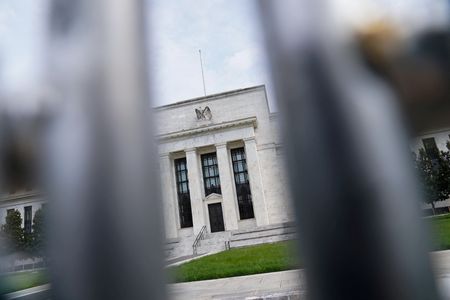By Howard Schneider
WASHINGTON (Reuters) – A year after U.S. inflation peaked and touched off an aggressive turn in monetary policy, Federal Reserve officials may soon open a more encouraging chapter in their policy discussions with the first of what many analysts expect to be a run of data showing renewed declines in key price measures.
Consumer price index data for June will be released Wednesday morning, with economists polled by Reuters expecting prices to have risen 3.1% from a year earlier, a material leg down in an annual inflation rate that clocked in at 4% in May and topped 9% in June 2022, the highest in four decades.
A separate measure of underlying inflation, stripped of items like energy and food that are tied to world commodity markets, is expected to show a more modest change, falling to 5% from a 5.3% pace the month before.
But economists and some Fed officials are starting to be more adamant that a long-awaited steady turn down in so-called “core” inflation may start with Wednesday’s report on how prices behaved last month and continue for the next few months.
“The June data is likely the leading edge of a string of softer core inflation prints over the next several months,” wrote Omair Sharif of Inflation Insights, with drops in used car prices, signs of ebbing demand in the service sector, an expectation for slower airfare increases, and other factors all feeding into a combined easing of U.S. price pressures.
A month of good inflation news won’t push the Fed away from an expected quarter point rate increase at the upcoming July 25-26 meeting.
The central bank has a 2% inflation target measured against the separate Personal Consumption Expenditures price index, and a closely watched version of it, also stripped of volatile food and energy prices, has been lodged at around 4.6% since December.
Fed officials have said they need to see steady declines there to be comfortable inflation is under control and on a dependable path back to target.
‘MOMENTUM’ NOW ON THEIR SIDE?
Recent data has been somewhat ambiguous – slowing overall job growth for example coupled with still strong wage increases some officials worry will feed future inflation; an improved mood in recent small business surveys offering evidence of economic resilience, but a boost as well in the share of business owners planning to raise prices.
But, importantly, public expectations about inflation have remained under control. A study released this week from the Cleveland Federal Reserve’s Center for Inflation Research found the long-term inflation outlook was “anchored near the Federal Reserve’s 2% target,” a finding generally shared by Fed policymakers who consider any move higher in public inflation expectations a risk inflation itself may accelerate.
The calendar is also turning in the Fed’s favor, with some of the worst inflation months falling from the calculations of annual price increases, and recent, weaker data on housing rents set to become more prominent in the numbers.
Supply pressures continue improving globally, and recent online price data suggests easing goods prices. A measure of prices for goods purchased online, maintained by software and analytics firm Adobe, showed prices fell 2.6% in June, the largest drop since May 2020, led by an 8.3% drop in appliance prices and a 12.9% year on year drop in electronics prices.
Fed officials, blindsided by the persistence of inflation they initially thought would dissipate on its own, have been reluctant to bank on good news continuing. Far from declaring victory over inflation they’ve focused on the risks it might resurge, worried over its stubbornness, and been more likely than not to pencil in higher interest rates if there was any doubt.
But in recent projections 13 of 18 policymakers expected the Fed was perhaps a quarter or a half a percentage point from its stopping point for rate hikes, a fact that coming inflation data may help to confirm.
Some feel inflation has turned to the degree event that may be unnecessary.
In comments this week Atlanta Federal Reserve President Raphael Bostic said he felt the Fed now “had momentum” in its inflation fight and, in his view, won’t have to raise rates again.
“The underlying data is actually telling a very positive story,” Bostic said, and upcoming information may make that clearer.
(Reporting by Howard Schneider; Editing by Dan Burns)
Brought to you by www.srnnews.com







